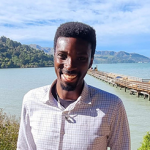Since 2019, Ghana has seen numerous watershed moments that included the forced closure of LGBT+ Rights Ghana’s office and the unlawful arrest of 21 queer human rights advocates. All watershed moments were accompanied by a coordinated media blitz that controlled what could be said and therefore known about sexual and gender minorities, paving the way for anti-LGBT* legislation to be introduced in Parliament in 2021. In the wake of this visibility, local LGBT* activists reported an uptick in intolerance and violence towards sexual and gender minorities.
Drawing from previous work on how “sexual moral panics” in Ghana helped transform the local meanings of LGBT identity categories, Kwako Adomako uses the breathless coverage of anti-LGBT* controversies to investigate how notions of time, space, ‘development’ and ‘civilization’ are used to consolidate political power.
Though scores of authors show that narratives tied to ‘development’ often carry colonial echoes and ‘civilizational’ undertones, Adomako argues that transnational networks of anti-LGBT* activists normalise the tropes that fix Euro-America as Africa’s future and Africa as Euro-America’s past. From the standpoint of Euro-America’s past, local Ghanaian anti-LGBT* activists are empowered to deploy ‘backwardness’ to signal to their Western counterparts a mastery of evangelical politics that outpaces them. Yet, this presentation wrestles with a conceptual ambivalence as political leaders cast local sexual and gender minorities as corrupted by ‘neocolonial’ influence that “threatens national values,” and undermines national development. What does it mean for the same political leaders to criminalize these sexual and gender minorities while ultimately using Western evangelical political strategies to do so?
About the speaker
Kwaku Adomako is completing his PhD at the Université of Lausanne under the co-supervision of Prof. Sébastien Chauvin at the Centre en études genre and Dr. Claire Somerville of the Gender Centre at the Geneva Graduate Institute. His work focuses on the internationalization of debates surrounding sexual and gender diversity, and how Ghanaian pro and anti-LGBT* interest groups compete to produce, influence and even transform local meanings attached to LGBT* social categories.




